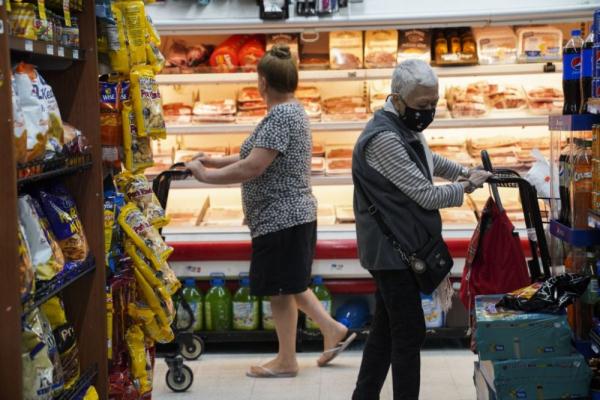
在世界經(jīng)濟(jì)論壇峰開(kāi)幕之際,全球慈善機(jī)構(gòu)樂(lè)施會(huì)發(fā)布報(bào)告稱,新冠疫情期間每30個(gè)小時(shí)就有一位新的億萬(wàn)富翁誕生,而2022年每33個(gè)小時(shí)就有近100萬(wàn)人正陷入極度貧困。樂(lè)施會(huì)建議向大發(fā)疫情財(cái)?shù)膬|萬(wàn)富翁們征稅,補(bǔ)貼因生存成本上漲而陷入貧困的民眾。

A new billionaire emerged every 30 hours during the Covid-19 pandemic, and nearly a million could fall into extreme poverty at around the same rate in 2022. Those are the sobering statistics recently released by Oxfam.
全球慈善機(jī)構(gòu)樂(lè)施會(huì)近日發(fā)布的數(shù)據(jù)揭示了一個(gè)冷酷的現(xiàn)實(shí):新冠疫情期間每30個(gè)小時(shí)就有一位新的億萬(wàn)富翁誕生,而2022年每33個(gè)小時(shí)就有近100萬(wàn)人正陷入極度貧困。
There were 573 more billionaires in the world by March 2022 than in 2020, when the pandemic began, the global charity said in a brief that was published on Monday, the first day of the World Economic Forum summit in Davos, Switzerland. That equates to one new billionaire every 30 hours, Oxfam said.
樂(lè)施會(huì)在5月23日發(fā)布的一份簡(jiǎn)報(bào)上稱,2022年3月世界上的億萬(wàn)富翁總?cè)藬?shù)比2020年疫情初期增加了573位。樂(lè)施會(huì)表示,這相當(dāng)于每30個(gè)小時(shí)就有一位新的億萬(wàn)富翁誕生。5月23日是瑞士達(dá)沃斯舉行的世界經(jīng)濟(jì)論壇峰會(huì)開(kāi)幕的日子。
On top of that, it estimated that 263 million people could be pushed into extreme levels of poverty in 2022 because of the pandemic, growing global inequality and rising food prices that have been exacerbated by the war in Ukraine. That’s the equivalent of nearly a million people every 33 hours, Oxfam said.
此外,樂(lè)施會(huì)估計(jì),2022年將有2.63億人因?yàn)橐咔椤⑷虿黄降葠夯蜑蹩颂m戰(zhàn)爭(zhēng)加劇的食品價(jià)格上漲而陷入極度貧困。樂(lè)施會(huì)表示,這相當(dāng)于每33個(gè)小時(shí)就有近100萬(wàn)人陷入極度貧困。
The organization pointed out that billionaires were collectively worth $12.7 trillion as of March. In 2021, billionaire wealth represented the equivalent of nearly 14% of global gross domestic product.
樂(lè)施會(huì)指出,截至2022年3月,億萬(wàn)富翁資產(chǎn)總和達(dá)到了12.7萬(wàn)億美元(約合人民幣84.6萬(wàn)億元)。2021年,億萬(wàn)富翁的總資產(chǎn)相當(dāng)于近14%的全球國(guó)內(nèi)生產(chǎn)總值。
Gabriela Bucher, executive director of Oxfam International, said that billionaires were arriving at the Davos summit to “celebrate an incredible surge in their fortunes.”
國(guó)際樂(lè)施會(huì)的執(zhí)行總監(jiān)加布里埃拉·布赫指出,億萬(wàn)富翁們來(lái)達(dá)沃斯峰會(huì)是為了“慶祝自己財(cái)富的驚人增長(zhǎng)”。
“The pandemic and now the steep increases in food and energy prices have, simply put, been a bonanza for them,” she said.
她說(shuō):“簡(jiǎn)而言之,疫情和當(dāng)前食品能源價(jià)格的飛漲給他們帶來(lái)了財(cái)運(yùn)。”
“Meanwhile, decades of progress on extreme poverty are now in reverse and millions of people are facing impossible rises in the cost of simply staying alive,” Bucher added.
布赫還表示:“與此同時(shí),幾十年來(lái)對(duì)抗極度貧困取得的進(jìn)步如今正在倒退,數(shù)以百萬(wàn)計(jì)的人正面臨基本生存成本的突飛猛漲。”
Oxfam said the fortunes of food and energy billionaires rose by $453 billion in the last two years, equating to $1 billion every two days.
樂(lè)施會(huì)指出,食品和能源業(yè)的億萬(wàn)富翁在過(guò)去兩年間資產(chǎn)增長(zhǎng)了4530億美元,相當(dāng)于每?jī)商炀腿胭~10億美元。
For instance, food giant Cargill was reported to be one of four companies that control more than 70% of global agricultural market, Oxfam said. The corporation, owned by the Cargill family, generated a net income of nearly $5 billion last year — the biggest profit in its history. There are now 12 billionaires in the Cargill family alone, it said, up from eight prior to the pandemic.
樂(lè)施會(huì)舉了個(gè)例子,食品巨頭嘉吉公司據(jù)報(bào)告是控制全球逾70%的農(nóng)產(chǎn)品市場(chǎng)的四家企業(yè)之一。嘉吉家族擁有的這家企業(yè)去年獲得了近50億美元的凈利潤(rùn),這是該企業(yè)有史以來(lái)的最高利潤(rùn)。現(xiàn)在光是嘉吉家族內(nèi)部就有12名億萬(wàn)富翁,而疫情前共有8名。
Meanwhile, Oxfam said the pandemic created 40 new billionaires in the pharmaceuticals sector. The billionaires are those who profited from their companies’ monopolies over vaccines, treatments, tests and personal protective equipment.
樂(lè)施會(huì)指出,與此同時(shí),疫情在制藥行業(yè)催生出了40名新的億萬(wàn)富翁。這些億萬(wàn)富翁憑借各自企業(yè)對(duì)疫苗、治療、檢測(cè)和個(gè)人防護(hù)設(shè)備的壟斷而獲利。
In order to prevent even starker wealth inequality, and to support people with rising food and energy costs, Oxfam recommended that governments impose one-off solidarity taxes on the pandemic windfalls of billionaires.
為了防止財(cái)富不平等進(jìn)一步加劇,給無(wú)力應(yīng)對(duì)食品能源價(jià)格上漲的民眾提供支持,樂(lè)施會(huì)建議政府向因疫情而大發(fā)橫財(cái)?shù)膬|萬(wàn)富翁們征收一次性“團(tuán)結(jié)稅”。
The charity also suggested that governments end “crisis profiteering” by introducing a 90% temporary excess profit tax on the windfalls generated by big corporations across all sectors.
樂(lè)施會(huì)還建議政府通過(guò)對(duì)各行業(yè)大公司臨時(shí)征收90%的暴利稅,來(lái)終止富翁從危機(jī)中獲利。
Oxfam also proposed a permanent tax to rein in extreme wealth, monopoly power and the higher carbon emissions produced by the super-rich.
樂(lè)施會(huì)還提議征收固定稅以限制超級(jí)富豪的巨額財(cái)富、壟斷權(quán)力和高碳排放量。
It said that an annual wealth tax starting at 2% on millionaires and 5% on billionaires could generate $2.52 trillion a year. That would be enough to lift 2.3 billion people out of poverty, make enough vaccines for the global population, as well as deliver universal health care and social protection for those living in low and lower-middle income countries.
樂(lè)施會(huì)指出,每年對(duì)百萬(wàn)富翁征收起步稅率為2%的財(cái)富稅,對(duì)億萬(wàn)富翁征收起步稅率為5%的財(cái)富稅,一年就能產(chǎn)生2.52萬(wàn)億美元的稅收收入。這些錢足夠讓23億人脫離貧困,為全球人口提供足夠的疫苗,還能為中低收入國(guó)家的民眾提供全民醫(yī)保和社保。
Speaking to CNBC’s Karen Tso in Davos on Monday, Bucher said that there are people in a “battle for survival.”
布赫5月23日在達(dá)沃斯對(duì)話美國(guó)消費(fèi)者新聞與商業(yè)頻道的凱倫·左時(shí)表示,有些人正在“為生存而戰(zhàn)斗”。
“We need to think about extreme wealth because there is extreme wealth, the hopeful part of all of this is that wealth exists in the world, it’s just very badly distributed,” she said.
她說(shuō):“我們需要考慮巨額財(cái)富,因?yàn)榫揞~財(cái)富確實(shí)存在。給人帶來(lái)希望的是,財(cái)富存在于世界上,只是分配得很不公平而已。”
英文來(lái)源:美國(guó)消費(fèi)者新聞與商業(yè)頻道
翻譯&編輯:丹妮
